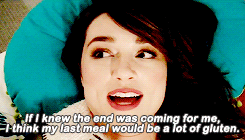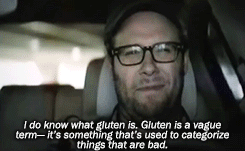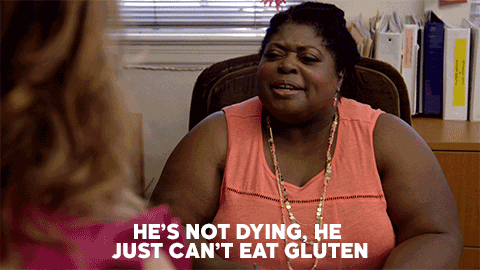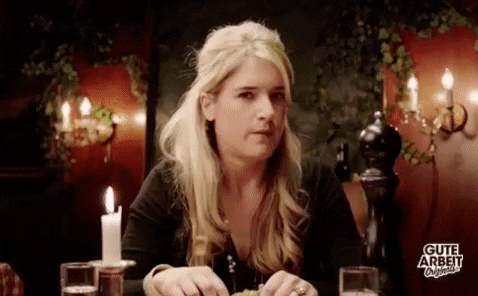Celiac disease (and gluten intolerance) are manageable with a gluten-free diet, but navigating a gluten-filled world is not easy, and it can be exhausting. Help your friends out by keeping these 5 things in mind!
1. "Just a little" is too much.

Any amount of gluten is too much, and is enough to make a person with Celiac or gluten intolerance sick! That means they can't just pick the croutons off the salad, and they can't pull the breading off fried chicken, and they can't eat Thanksgiving turkey that has been stuffed with bread stuffing. If the food has been contaminated with gluten, that food is no longer a viable consumable option for a person with Celiac.
What you can do: Please be mindful of cross-contamination while you're out together at restaurants or hanging out in the kitchen together.
2. "Sick" is not an exaggeration.

When someone with Celiac disease says that they will get sick if they eat gluten, they mean they could have problems that last for months after exposure. Symptoms range from vomiting, diarrhea, and constipation, to malabsorption, rash, and immunocompromisation. Eating gluten damages the actual physical intestine of a person with Celiac, so it takes time and healing to get that gut health back. In extreme cases, some people get so sick that they require hospitalization.
What you can do: When your friend says they can't eat something because they will get sick, believe them, and encourage them to stay healthy however they can.
3. A little research goes a long way.

I have been asked the following serious questions:
"Does fruit have gluten?"
"Does chocolate have gluten?"
"Do potatoes have gluten?"
"What do you even eat then?"
It is so much easier to cook at home than it is to go to a restaurant, but that doesn't cover friend's houses, work parties, and family functions. Having to maneuver through these environments gets easier with time and experience, but it's still tough, and answering lots of questions at the same time can be emotionally taxing.
What you can do: Definitely continue to ask if you're unsure, but consider what information may already be available to you on the internet. Please also consider why you're asking these questions. If you are curious about what has gluten, it may be more helpful to direct your questions toward research rather than your friend. However, if you want to learn about what your friend is going through, they are definitely the person to ask! Everyone's experience is different, but respecting your friend's health instead of making fun of their restrictions (I'm looking at you "bowl of ice: meme) will go a long way in making everyone's experience better!
4. Please remove "You can't eat that." from your vocabulary.

There are a lot of restrictions that come with Celiac disease and gluten intolerance, so it feels a little overbearing when someone says "Oh, you can't eat that." This sentence in all of its varying forms, makes me cringe. On the very rare occasion that a food should be gluten-free and isn't, and you'd like to alert your friend of that fact, PLEASE DO! Their safety is at stake if you don't! However, if its bread, pastry, pasta, cookies, fig bars, whatever - we know. It's not gluten-free. Please be kind when you alert your friends to that fact.
What you can do: Be considerate. It's very likely that your friend already knows they can't safely eat whatever thing it is they can't eat, which might be a bummer to them if they were expecting some good options for them, so pointing it out could be a little much.
5. We don't always have to pick the restaurant.

I get asked to pick the restaurant a lot, because of my dietary restrictions. I don't mind, but it is really not necessary to be fearful of picking a restaurant and letting me find something good once we get there. Besides, if you pick a restaurant that says "gluten-free" on the menu, we're in business. Besides, we can always eat salad. If I was going to write a #6 though, it would be "We do not always want to eat salad."
What you can do: Don't put all the pressure on your gluten-free friend to pick a place to eat. Collaborate! Make it fun!
These are just a few suggestions and things to be aware of when it comes to Celiac disease and gluten intolerance, and you can always talk to your friends about what their preferences are in many of these situations! They will thank you, as I thank you, for trying to be a better ally and friend.














